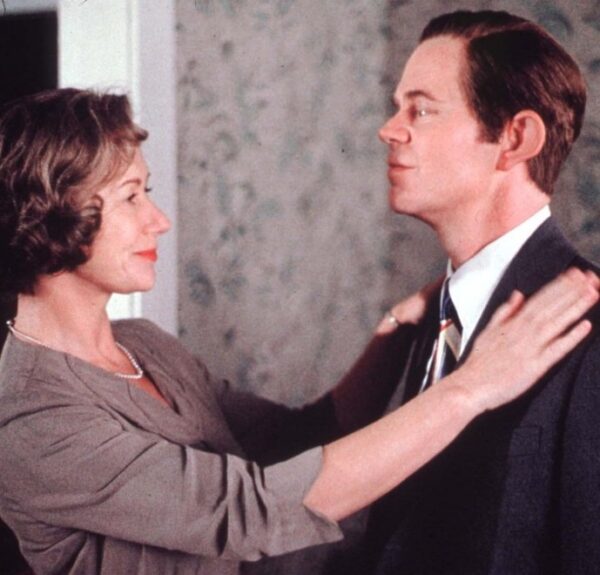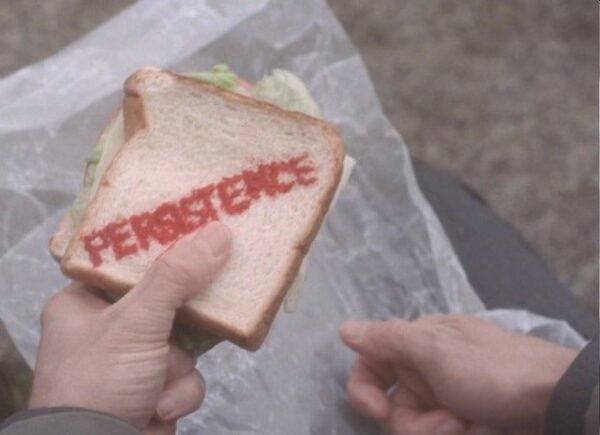The Story of an Extraordinary Salesman
PG | 1h 30 min | Drama, Biopic | 2002
In 1868, J.R. Watkins bought the manufacturing rights to a liniment, then started making it in the kitchen of his home in Minnesota. Soon he built a thriving multi-product business in the United States and Canada, on the back of an army of door-to-door salesmen.
In 1955, Bill Porter joined the Watkins Company and went on to become, at one time, its top seller in all of Oregon, Idaho, Washington, and California. For over 40 years, he sold its detergents, soaps, and fabric-softeners. He was its only door-to-door salesman, even when the company had as many as 44,000 salespeople using more contemporary, phone or online, selling platforms.

Steven Schachter’s movie is about Bill (William H. Macy) whose mom, Mrs. Porter (Helen Mirren), convinces him as he starts his first job that he’ll be a fabulous salesman like his late father.
Why is any of this heroic? Schachter shows you.
Bill has suffered since birth from cerebral palsy. Nearly everything about him is off. One hand hangs stiffly by his side, like he’s wielding a weapon behind his back. His other hand carries a weighty sales satchel.
He hunches forward, as if an imaginary telephone book is dangling from his chest, ready to keel over if you so much as flip a page. He limps. His ears stick out, like boom bars at a gateway. His cheek bunches sideways in a half-smile that’s anything but.
His gnarled face garbles his already strained speech, as vowels and consonants jostle their way out of his mouth. He prepares his paperwork (checks and the like) on a typewriter, with the one good finger of his one good hand.
As you soak in the staggering challenge ahead when Bill leaves for his first job interview, his mom overstates his strengths, “You look like a million,” and understates his weaknesses, “It takes people a wee bit longer to warm up to you. Just be patient, and persistent.”

Those words become his motto. Not only does he get a job, he excels at it. Grabbing a bite when he’s tired and hungry, he smiles on seeing that his mom has scrawled ketchup lettering on his sandwich, “PATIENCE” on one slice, “PERSISTENCE” on the other. Bill uses both qualities to cope with repeated, often rude, rejection.
Yes, he’s occasionally put off by a barking dog or squabbling neighbors. Nothing else deters him, certainly not the words “no,” “not now,” or “never again.” He loves his job. It gives him meaning, and earns him independence and respect.
Bill may be selling stain-removers all right, but the stain he’s fighting is prejudice; stained perceptions about what the differently abled can and can’t do. After a whole day’s effort, and countless rejections, he makes one sale. One! What does he excitedly tell his mom? “I made a sale!”
At a diner, Mrs. Porter deals with bullies (mocking Bill’s awkwardness), using ketchup, again, to make her point. She’s telling Bill that when you use what you have, you worry less about what you don’t have.
As his mom ages, ails, and has to be admitted to a care home, she feels like a burden on him. Bill’s arranging her room, she’s sitting on the bed, fidgeting with her glove. Then the camera zooms out to frame only her, lost in her thoughts, her guilt at being unwell, her anxiety over his future without her.
Caring Salesman
Charmingly, Bill takes customers into his confidence: “Can I be candid with you?,” even when he’s suggesting something as engrossing as a new line of bleaches.
They end up confiding in him, and he becomes a repository of knowledge about neighborhood bonds being built or broken. For all the brain damage he’s suffered, he becomes a kind of emotional super-neuron carrying “signals” of feeling, seamlessly, from one neighbor to the next, bringing them closer to each other, not just to him.
To Bill, customers are more than a “sale,” they’re human first. He sees beyond their gruff exterior, their scowling impatience, their weary smiles. They’re flawed like him, only differently, and he treats them with the respect they deserve.
But, like so many in need (orphans, the aged, or terminally ill), not just differently abled people, Bill sees an offer of help as a sign of pity or charity. To him that’s an affront, not affection. When the doctor warns Bill that, if he doesn’t stop walking all those miles, his worsening spinal stenosis will cripple him, he just keeps going. He’s too proud to sit around and collect “disability” on account of his condition.
Only later does he realize that sometimes, an offer to help may be nothing more: a response to a need. It’s not an admission of inferiority, unless we make it so. For love has two sides. It’s fine to love. It’s better to also be comfortable with being loved back.

‘Door to Door’
Director: Steven Schachter
Starring: William H. Macy, Helen Mirren, Kyra Sedgwick
MPAA Rating: PG
Running Time: 1 hour, 30 minutes
Release Date: July 14, 2002
Rated: 4 stars out of 5





